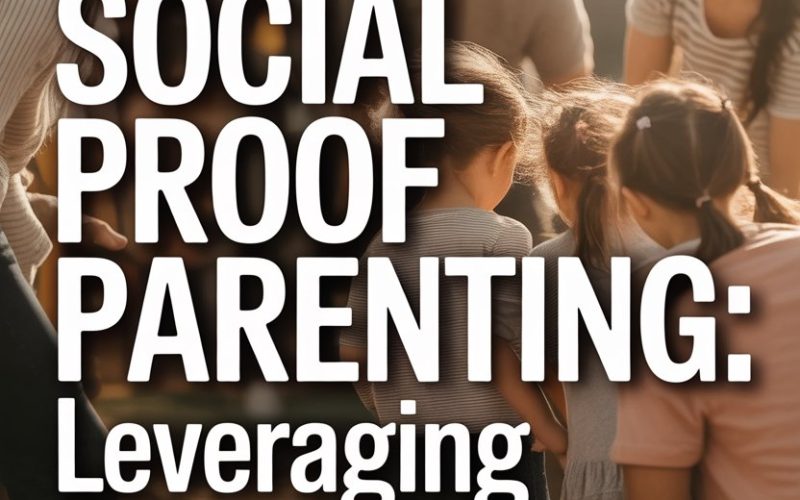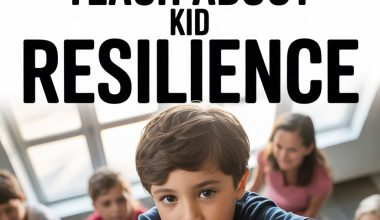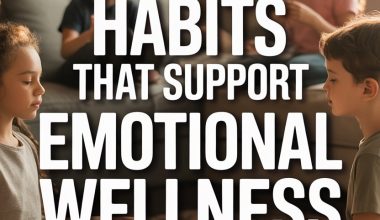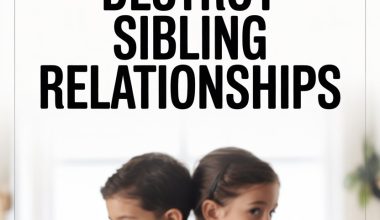Ever watched your child suddenly crave celery sticks simply because their best mate at school packed some for lunch?
If so, you’ve witnessed social proof parenting in action—no TED Talk required.
Peer influence isn’t just the stuff of teen drama or playground politics. Every parent, whether raising a toddler or a teenager, can harness the subtle magic of social proof.
The trick is learning to spot it (and steer it) before it turns your living room into a recreation of Lord of the Flies.
What Is Social Proof and Why Should Parents Care?
Social proof is a posh way of saying “monkey see, monkey do.” Humans, both big and small, look to others when deciding what’s normal, acceptable, or worth trying.
That’s how we end up with trends like fidget spinners, TikTok dances, or—for us older folks—those questionable ‘90s hairstyles.
Children are especially wired to follow the crowd. A classic study from the University of Virginia found that teens are more likely to take risks in a driving simulation if their friends are watching.
Peer presence lights up the brain’s reward centre like a Christmas tree.
Why does this matter to parents? Because you can harness this built-in tendency for good, steering kids toward positive behaviour without sounding like a broken record.
Peers: Your Secret Parenting Weapon
Kids want to fit in—that’s headline news to absolutely no one. But peer influence goes far beyond copying the latest slang or snack trend.
Research from Stanford University shows that students are more likely to adopt healthy study habits when they see their friends doing the same.
For parents, this means you don’t have to be the only role model in your child’s universe. In fact, sometimes a peer’s example does more heavy lifting than a parent’s gentle (or, let’s be honest, exasperated) reminder.
Who’s in the Room? Setting Up Positive Peer Groups
If your child’s social circle includes pint-sized troublemakers, you might be tempted to move house. Good news—there’s a less dramatic solution.
Encourage connections with children who model the values you care about. That could mean signing up for Scouts, joining a sports team, or arranging playdates with classmates who don’t turn every snacktime into a food fight.
You don’t need to vet every friend like an MI5 agent. Just be proactive about making it easy for your child to spend time with peers who bring out their best side.
Model the Behaviour You Want to See—And Let Kids See Others Doing It Too
No, you don’t have to eat your broccoli with a grin. But if you want manners at the dinner table, invite over that family whose children say “please” and “thank you” without being prompted.
Children are more likely to follow the group’s lead, even if it means pausing their own tantrum to fall in line with the pack.
Researchers at Harvard have found that children internalise expectations not just from parents, but from the behaviour norms of their social circles.
If the group’s norm is kindness, generosity, or trying new things, your child will often rise to the occasion.
Use the Power of “Everybody’s Doing It” (For Good, Not for Guilt)
Advertising agencies have been whispering “everyone’s buying this!” for decades. Why not borrow a page from their playbook for the greater good?
Younger children, in particular, respond well to knowing that “in our family, we all help tidy up,” or “lots of your friends are learning to ride bikes.”
Older kids still care deeply about fitting in, even if they pretend otherwise. If most kids in their class are joining a reading challenge, your reluctant reader might suddenly get curious.
Just don’t overdo it. Children are suspicious of adults who lay it on thick—especially teens, who can spot a set-up faster than you can say “Snapchat streak.”
When Peer Influence Turns Sour: Spotting Red Flags
Nothing strikes fear into a parent’s heart quite like the phrase “bad influence.” But before you panic, remember that children will encounter all sorts—some delightful, some less so.
Watch for sudden changes in your child’s behaviour, attitude, or language. If your eight-year-old comes home swearing like a football hooligan, it’s time for a gentle chat.
Ask open-ended questions: “Who did you play with today?” or “What was the funniest thing that happened at school?”
Keep lines of communication open, even if your child insists nothing’s wrong. According to child psychologist Dr. Lisa Damour, kids who feel safe turning to their parents for help are better equipped to resist negative peer influence.
Empowering Kids to Use Their Own Social Proof
Peer pressure isn’t always about following the crowd. Sometimes, children can be leaders in shaping what’s “cool” in their group.
Encourage your child to invite friends over for activities you value—craft projects, community volunteering, screen-free games. If your child’s the trendsetter, others may follow suit.
Role-play tricky scenarios. “What would you do if your friend wanted to cheat at a game?” or “How could you help a friend who’s nervous about speaking up in class?”
Giving kids scripts and strategies helps them feel confident when peer pressure rears its head.
Digital Peer Influence: Not Just ‘Stranger Danger’
Peer influence doesn’t clock out after the school bell rings. Social media, group chats, and gaming platforms bring peer input straight into your living room.
Staying plugged in to your child’s digital life is just as important as knowing who they hang out with at the park.
Talk about what they see online, and help them distinguish between healthy trends (book clubs, fitness challenges) and risky ones (viral pranks that end with someone’s eyebrows missing).
The Child Mind Institute suggests co-viewing media when possible and encouraging thoughtful conversations about online behaviour. “Would you want your nan to see that video?” works wonders.
Community Counts: Building a Village of Good Influence
No one raises a child in a vacuum. Schools, sports coaches, after-school clubs, faith groups—they all shape your child’s sense of what’s normal.
Get involved where you can, even if it’s just turning up for the occasional bake sale or Saturday match.
Children notice when their parents value community ties, and they’re more likely to invest in friendships that reinforce positive values.
If your child’s school has a mentoring or buddy program, encourage them to join. Studies show that young people who feel connected to a supportive community are more resilient and less likely to fall in with the wrong crowd.
Turning Social Proof Into a Parenting Superpower
Harnessing peer influence doesn’t mean outsourcing your parental authority to a committee of six-year-olds. It’s about recognising the powerful sway of the group and using it to reinforce the values and behaviours that matter most to your family.
Make positive peer interactions part of daily life. Let your child see you collaborating with friends, neighbours, and strangers at the supermarket.
Celebrate kindness, creativity, and effort when you spot it—in your child and in others.
Above all, keep the conversation going. Children who feel heard are less likely to be led astray by the pack.
With a bit of luck (and the occasional nudge), your child’s “everybody’s doing it” moments will be ones you can feel proud of.
Bringing It All Home
Peer influence isn’t the enemy—it’s a tool.
One that, with a little wit and a lot of love, can help your child grow into a confident, caring, and connected human being.
And who knows? The next time you catch your child eating celery, you might just thank their brilliant mate from school. Or, at the very least, you can smugly take credit for planting the social seeds.
Either way, the monkeys—and the parents—are doing just fine.




